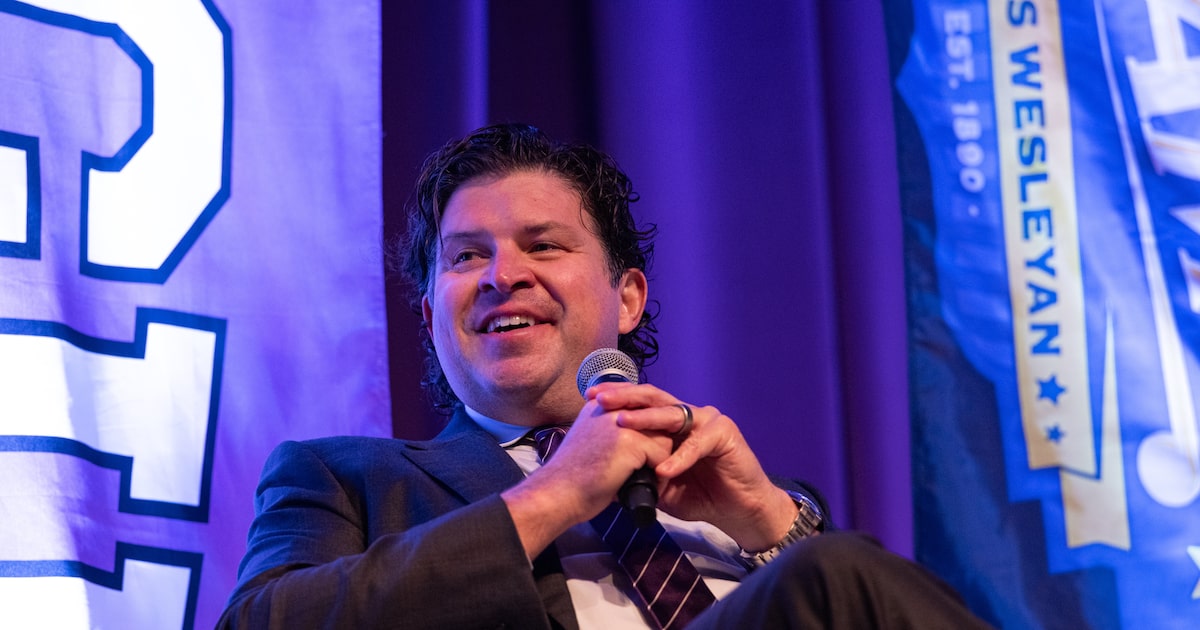In the competition for workers, Texas’ workforce talent is under siege. And the state’s top students are the prize.
“Over the next 12 to 15 years, Texas will be among the two largest high school graduate-producing states,” Tarleton State University President James Hurley said. Neighboring states will recruit from Texas to backfill their quotas and budgets, Hurley said.
Related
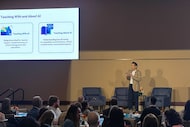
Retaining homegrown talent was a focus point Monday during a Tarrant County higher education panel hosted by Texas Christian University at Bass Performance Hall in Fort Worth. The panel was the opening event of TCU’s celebration week prior to the inauguration of its 11th chancellor, Daniel W. Pullin.
The Education Lab
Fort Worth is growing rapidly as Texas maintains the world’s eighth-largest economy. But the region needs to build upon that growth by bolstering the educational attainment of its residents, said higher education leaders.
That matters in North Texas, where 24% of the state’s students are enrolled in a college or university, said Fort Worth Mayor Mattie Parker. She also said 26% of Texas degrees are completed in the D-FW area.
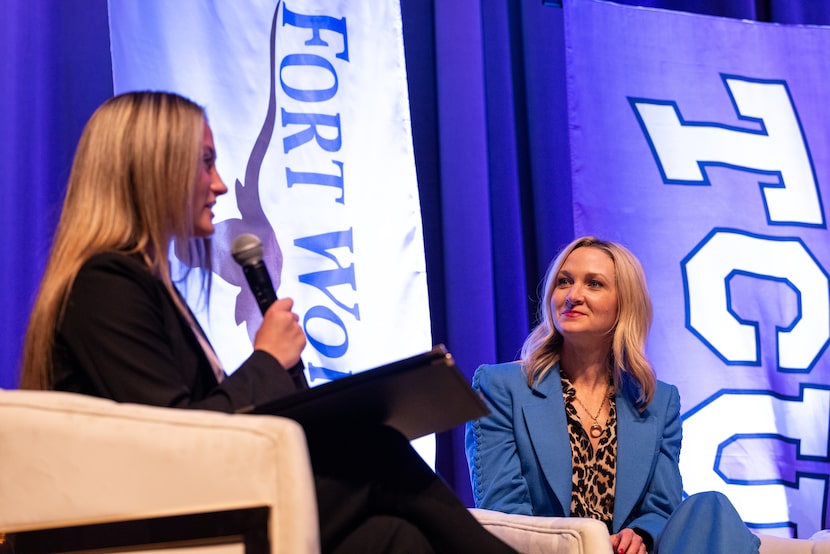
Fort Worth Mayor Mattie Parker listens to moderator and TCU Student Government Association President Reagan Stephens ask a question during a panel on Monday, Nov. 3, 2025, at Bass Performance Hall in Fort Worth.
Angela Piazza / Staff Photographer
“If you don’t have those credentials, you have a 12% chance of making a living wage,” Parker said. “When you look across Tarrant County, that reality exists today.”
Population growth is affecting schools as well. Tarleton State University, for instance, has grown by 60%, or to over 21,000 students, since 2019, Hurley said.
The influx of residents and businesses means higher education institutions are tasked with transforming inspiration into innovation, entrepreneurship and economic vitality, Pullin said.
“Inspiration plus inaction is nothing more than philosophy,” Pullin said, “but inspiration plus action is innovation.”
Community college advantage
Tarrant County College Chancellor Elva Concha LeBlanc listens to UNT Health Fort Worth President Kirk Calhoun speak during a panel on Monday, Nov. 3, 2025, at Bass Performance Hall in Fort Worth.
Angela Piazza / Staff Photographer
Parker and the county’s higher education leaders agreed that Tarrant County College plays a critical role in the innovation and retention of the region’s talent.
The community college has six campuses and a tuition of $74 per semester credit hour, said Elva Concha LeBlanc, chancellor of Tarrant County College. Of the community college system’s 200-plus programs, several are technical and students learn to be entrepreneurial.
The community college also partners with public schools and charter networks to graduate over 700 high school students with associate degrees annually before those students receive their high school diplomas, LeBlanc said.
However, 70% of Tarrant County College’s student body works and supports their families while attending school, LeBlanc said. The institution supports students with career advisors and options to take classes during the day or night, online, hybrid, and in person, she said.
Workforce advocates say this approach addresses the brain drain challenge and ensures students have supported paths from school and into the workforce.
“A student can start at the high school level in our early college high school, for example, completing at Tarrant County College, and move on to university or working,” LeBlanc said.
Bridging the gap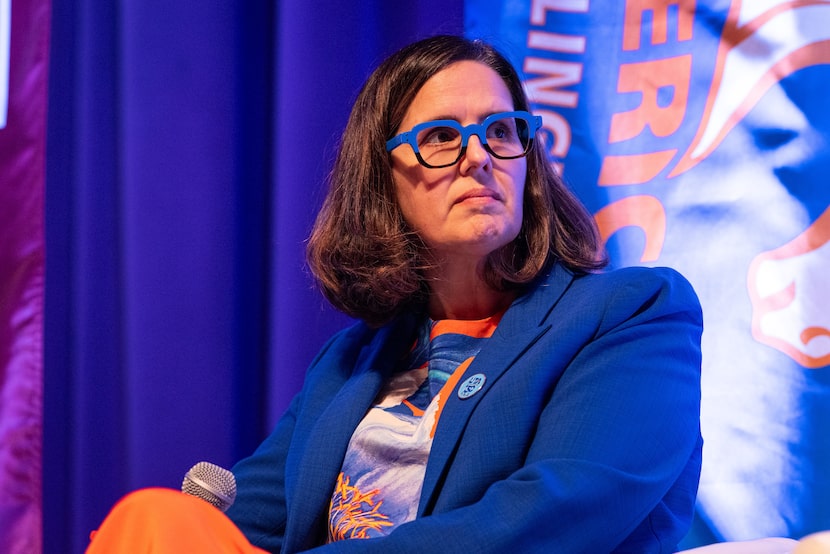
University of Texas at Arlington President Jennifer Cowley listens to another panelist speak on Monday, Nov. 3, 2025, at Bass Performance Hall in Fort Worth.
Angela Piazza / Staff Photographer
One of the biggest challenges to upward mobility is access to a higher education, said Jennifer Cowley, president of the University of Texas at Arlington.
Last November, the University of Texas System announced plans to ensure students whose families make less than $100,000 annually will get free tuition and waived fees at any UT academic campus. Over 7 million Texas families will meet the income requirements for the program, according to UT officials.
Meanwhile, Texas Christian University announced in August that Texans whose families make $70,000 or less annually will get free tuition.
“We serve more Pell-eligible students than the entire Ivy League combined,” Cowley said. “If you want to talk about creating social mobility and impact in our county, that’s the way we’re going to do it.”
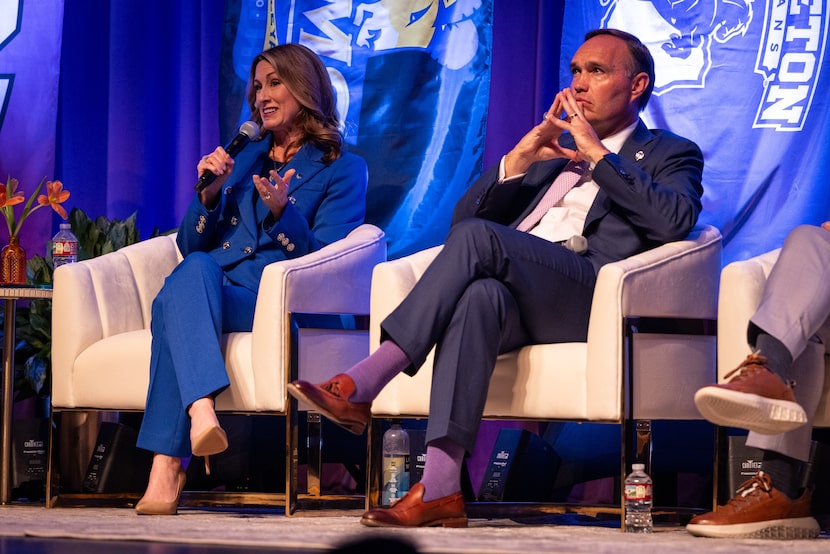
Tarleton State University President James Hurley listens to Texas Wesleyan University President Emily Messer speak during a panel on Monday, Nov. 3, 2025, at Bass Performance Hall in Fort Worth.
Angela Piazza / Staff Photographer
Texas Wesleyan University President Emily Messer said over half of their enrollees are first-generation college students. In the university’s new student class this year, 70% of the students are from Tarrant County, she said. They offer all new undergraduates financial aid and focus on “career integrated learning” to improve student outcomes, she said.
Kirk Calhoun, president of UNT Health Fort Worth, said higher education leaders should consider shortening the timeframe to obtaining degrees without compromising skills. He also wants to see more efforts to manage the cost of higher education, especially for graduate students.
Ultimately, one of the best ways to give students access to a higher education is to ensure students can take different pathways, such as trades, community college or universities, said Glenn Hegar, chancellor of the Texas A&M University System.
Cowley and the other education leaders agreed.
“We’re the talent engines that drive our economy,” Cowley said. “If we want to attract new industries to move into our region, it’s not going to happen if we’re not producing that talent.”
This reporting is part of the Future of North Texas, a community-funded journalism initiative supported by the Commit Partnership, Communities Foundation of Texas, The Dallas Foundation, the Dallas Mavericks, the Dallas Regional Chamber, Deedie Rose, Lisa and Charles Siegel, the McCune-Losinger Family Fund, The Meadows Foundation, the Perot Foundation, the United Way of Metropolitan Dallas and the University of Texas at Dallas. The News retains full editorial control of this coverage.
